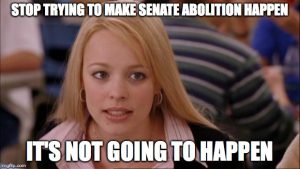Now that they’ve had a couple of days to digest the events, we’ve got some weekend punditry on the Duffy verdict and What It All Means™ for the Senate as an institution, and well, some of it is really hard to swallow. Rick Anderson has eight thoughts about the expenses issue, and most of them are on the right track, except for number four, which is about the Board of Internal Economy (Commons) and Internal Economy Committee (Senate), and his belief that these bodies are too political to police parliamentarian expenses. The problem with this line of thinking is of course parliamentary privilege – parliament is self-governing. It needs to be. It cannot be brought under the heel of a bureaucracy, because if we can’t trust our parliamentarians to run their own affairs, then we might as well just hand power back to the Queen. Do they get it right all of the time? No, of course not, but this is a democracy and there is an accountability process, and yes, that includes for the Senate. Of course with the Senate, it is much more tied to public pressure, but that public pressure has forced the Senate to make any number of changes in the past few years (they had already started before the whole ClusterDuff affair started, but that certainly accelerated things). This is of course why I have trouble with Adam Dodek’s condemnations of the Senate post-verdict and his (frankly wrong) assertions that nothing has really changed, and his assertion that most senators treat the job as a part-time gig. I’ve known very few senators who feel that way, and most that I’ve met and been in contact with are just as engaged as MPs with their files – even more in many cases when those senators have causes that they are engaged with. The days of senators sitting on a number of corporate boards is drawing to a close as boards are professionalising and the need for a senator as a “prestige” appointment become less common. (I would add that I actually think it’s not a problem for senators to sit on a non-profit board as a way of constituency outreach). And then there’s Michael Den Tandt who retreats to the same old fears about these new independent senators being wholly unaccountable, as though something has materially changed from when they were all in party caucuses (which is false), and that somehow that caucus could keep them more in line (no, not really). Apparently Den Tandt has forgotten that the Senate has institutional independence for a reason, and his musing that the Conservatives should champion abolition by way of a referendum is frankly ridiculous – despite what people may think about a referendum being a tactic to pressure premiers, it returns to the same problem of using majoritarian tactics to pressure minority provinces into giving up their counter-balancing representation. I think I’ll leave this meme here for his edification.
Good reads:
- Trudeau and cabinet are in Alberta to hold a retreat to talk deliverology, and met with Rachel Notley, who impressed upon them about the need for pipelines.
- There are questions as to whether the government’s budget implementation bill counts as omnibus or not.
- The budget bill looks to open the door to “asset recycling” to help generate new funds for infrastructure projects.
- The government looks set to blow up and rethink our whole system of Canadian Content rules.
- An internal policy paper to the government warns that organised crime may try to infiltrate the legal marijuana trade.
- Mike Duffy’s options for retribution against the Harper PMO will be limited.
- PEI Senator Elizabeth Hubley is not convinced that Duffy did nothing wrong.
- Retired senator Gerry St. Germain plans to fight the Senate to avoid repaying the items flagged by the Auditor General, in court if he has to.
- The government doesn’t appear to have any more money for most of the civil service in its budget.
- The Financial Post interviews Bill Morneau about his new life as finance minister.
- Michelle Austen writes about the damage the Federal Accountability Act has wreaked in finding the best and brightest to staff ministers’ offices.
Odds and ends:
While in New York, Trudeau went to see “Hamilton” on Broadway and meet its creator.

